Posts by Christopher Lochhead
285 How Category Contenders Become Category Leaders with Al Ramadan, Co-Author of Play Bigger
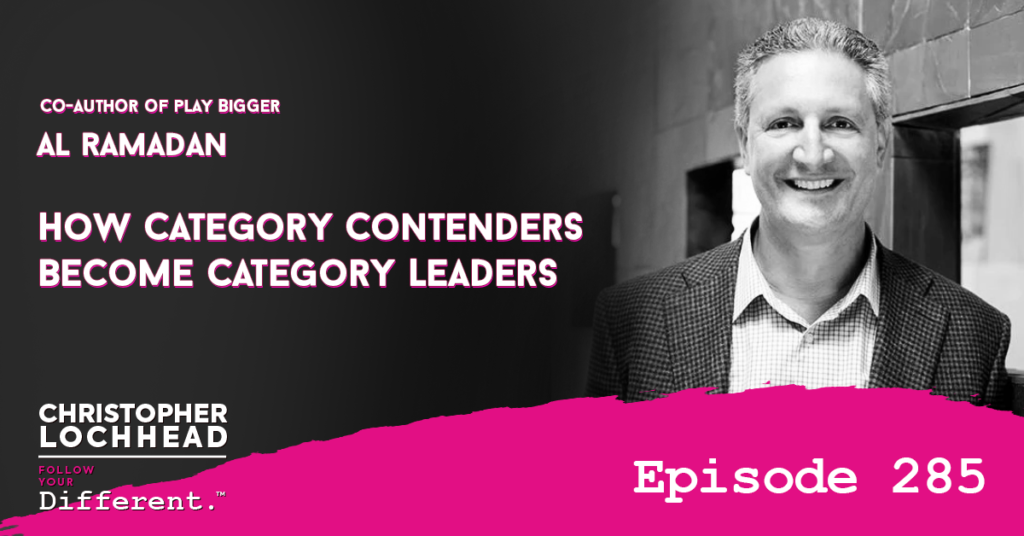
Podcast: Play in new window | Download (Duration: 1:12:00 — 49.4MB) | Embed
Subscribe: Apple Podcasts | Spotify | Pandora | RSS | More
On this episode of Christopher Lochhead: Follow Your Different, our guest Al Ramadan talks about what’s at stake when it comes to category battles, how you can spot the category challengers who can become category kings and queens, and what they need to become category leaders that earn 76% of the economics.
There comes a time in every startup’s life, where they face an epic, typically 18-to-36-month category battle. As we reported in our first book Play Bigger, the company that wins that battle earns 76% of the total value created in the category as measured by the market caps for public companies and valuations for private companies. What that means is, in any space, one company earns two thirds of the economics, which makes that category battle, which is typically 18 to 36 months long, arguably the highest stakes game in business.
This episode will be available on both Christopher Lochhead: Follow Your Different and Lochhead on Marketing, because we think it is that important that everyone must hear about it. So without further ado, let’s dive into this dialogue.
Play Bigger: Looking back, and its impact today
Al Ramadan comes into the conversation bearing data about the businesses and companies we’ve observed when writing Play Bigger, as well as some new players that have achieve the same feat since then.
To recap, Al Ramadan and Christopher Lochhead wrote a book back in 2014 called Play Bigger, which talks about category design and how it can make you become a category leader in your chosen space. One of the things they’ve found out in the course of their research is that Category Leaders tend to corner 76% of the value of said space.
Though when they wrote Play Bigger, the world was nowhere near as digitized as it is today. So a lot of the research was based on tech companies back then. But now, as more and more categories are behaving like tech categories due to digital scalability and digital reach, these findings are becoming true for every category.
Category Kings to Category Leaders
Al Ramadan shares that he and his team looked into the 35 Category Kings that they have observed back in Play Bigger, and check on their current situation in the market sphere.
In Play Bigger, we originally published a set of research and tracked 35 Category Kings in the tech space and their market caps at the time were 465 billion and those same companies today are now worth 1.9 trillion.
“If you track what happened to those 35 kings, as we call them back then, between the year of 2014 to the year of 2021. You want to know what the numbers are? At the time in 2014, the entire pool of the 35 category kings were valued at 465 billion. They are now valued at 1.9 trillion. That is, they’ve created more than $1,000,001.5 in market cap and the annual for those people who care about this stuff like Investors and Financial people. The compound interest growth rate of those kings. Market cap wise, is 22.46%.” – Al Ramadan
Given this data, it begs the question of how many understand that this is the new dynamic, and how many entrepreneurs and marketers still think that it’s a big leap of faith to follow.
To hear more from Al Ramadan and how Category Kings can become legendary Category Leaders, download and listen to this episode.
Bio
Al Ramadan is a co-founding partner of Play Bigger Advisors and coauthor of the book, Play Bigger. He also co-founded Quokka Sports, which revolutionized the way people experience sport online.
Al then joined Macromedia and Adobe, where he spent almost ten years changing the way people think about great digital experiences. At Adobe, Al led teams that created the Rich Internet Applications category and helped develop the discipline of experience design.
In the early ‘90s he applied data science to Australia’s Americas Cup — an innovation in sports performance analytics. His work in sailing led directly to the idea for Quokka. He lives in Santa Cruz, California.
Links
Connect with Al Ramadan!
Play Bigger | LinkedIn | Category Contenders
We hope you enjoyed this episode of Follow Your Different™! Christopher loves hearing from his listeners. Feel free to email him, connect on Facebook, Twitter, Instagram and subscribe on iTunes!
284 Building a 10,000 Year Clock, Jeff Bezos, Long-Term Thinking, & Being A Good Ancestor with Alexander Rose, The Long Now Foundation
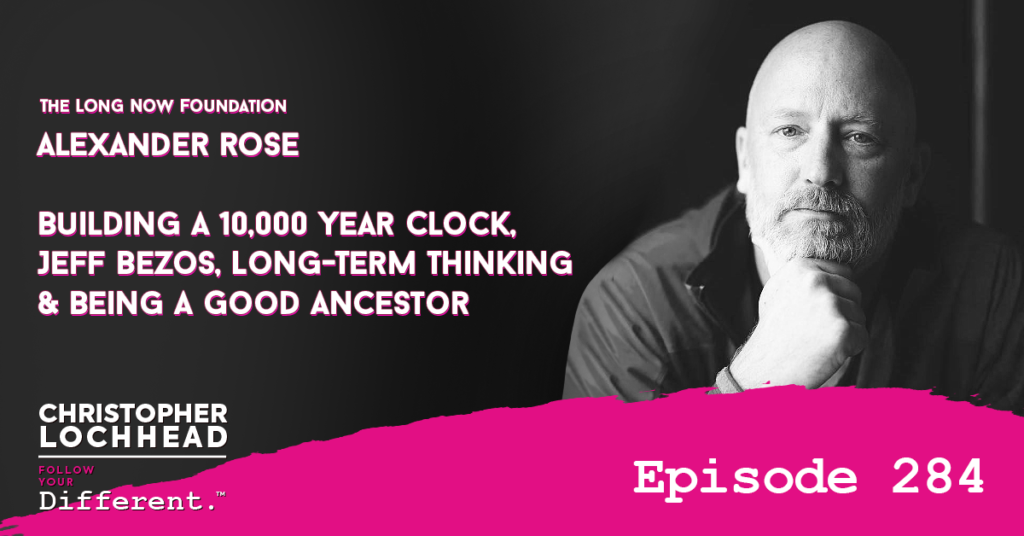
Podcast: Play in new window | Download (Duration: 1:13:44 — 50.6MB) | Embed
Subscribe: Apple Podcasts | Spotify | Pandora | RSS | More
On this episode of Christopher Lochhead: Follow Your Different, our guest Alexander Rose asked me a question that stopped me in my tracks. We go deep into that question, and a myriad of other topics in today’s dialogue.
Alexander Rose is the executive director of the Long Now Foundation. And their mission is to foster long-time, long-term thinking. And they’re probably most known for the building of this massive 10,000-year clock with the support of Jeff Bezos.
If you are anyone who cares about products, if you’re an engineer, a product leader, or frankly, anyone else who cares about creating products, or a different future, you’re going to love this conversation.
Alexander Rose on The Long Now Foundation
The conversation starts off with Alexander describing the purpose of The Long Now Foundation and The Long Now Idea itself. It was started by a set of both technologist and artists, who are part of the earlier generation of Silicon Valley.
“It was a group of people that were realizing that by the kind of fetishization of speed that was happening, especially around Silicon Valley, in technology, circles, that we were taking a lot of things off the table. So things like climate change, if you were only given a few years to solve something like that, you basically won’t even start. But if you are willing to think about something, at least in terms of centuries or generations, you could imagine how you might solve these large challenges that humanity is now facing.” – Alexander Rose
Brian Eno, one of the founders of the Long Now Foundation, coined the term, and he really stretched it out to the 10,000 years we’ve had, to the 10,000 years in the future, making it a 20,000-year story.
Humanity 10,000 Years into the Future
The focus then shifts into the story of what will happen 10,000 years into the future. For Alexander, he believes that humanity will still be there, but it depends on what we do today if they are thriving or struggling by then.
“I very much believe that humanity is going to be around for the next 10,000 years. The question is, are we making decisions that are going to help those future generations right now? As Jonas Salk originally asked: Are we being good ancestors, or are we being bad ancestors? And how can we be better ones?” – Alexander Rose
Alexander then proceeds to discuss our ongoing report card on the matter.
Alexander Rose on Thinking of the “Good Old Days”
Talking about the past, particularly the notion of the good old days, Alexander firmly thinks that we definitely have it better today than in the distant past. It is just that, we are used to modern comforts and the ever-growing technology at the palm of our hands, that we take those things for granted and focus on the bad things todays and reminisce on the good memories from the past.
Alexander describes it like a pendulum swinging back and forth. While there are swings on both directions, the momentum for the forward / positive swing is oftentimes bigger than the backwards or negative one. Though granted in today’s climate, it’s hard to see the positives than the negatives.
While the past would be nice to visit, a person from this time would find it a horrendous place to live in, minus the comforts that they have been accustomed to.
To learn more about Alexander Rose and The Long Now Foundation and mindset, download and listen to this episode.
Bio
Links
Connect with Alexander Rose!
We hope you enjoyed this episode of Follow Your Different™! Christopher loves hearing from his listeners. Feel free to email him, connect on Facebook, Twitter, Instagram and subscribe on iTunes!
156 How to Drive B2B Revenue Now with White Space Marketing
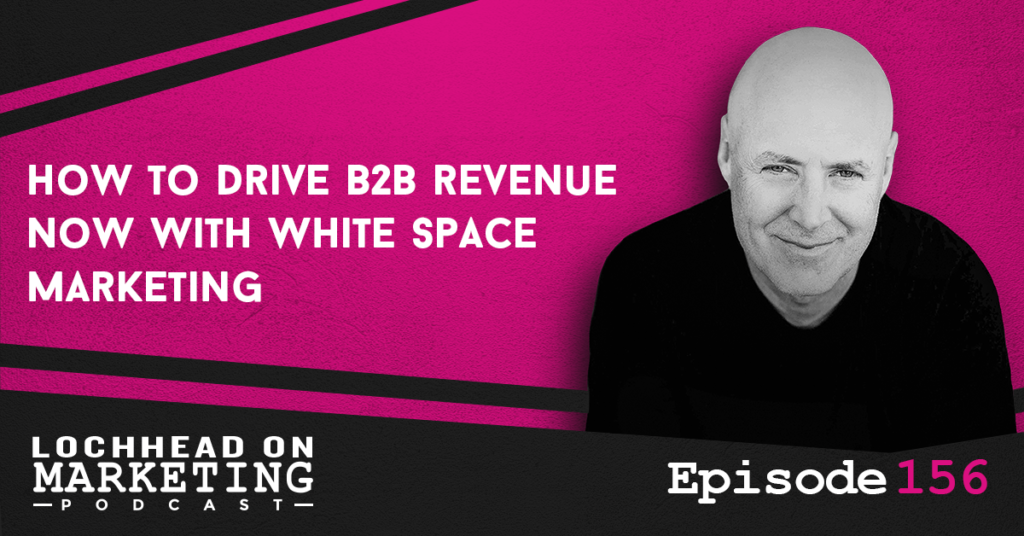
Podcast (lochheadonmarketing): Play in new window | Download (Duration: 12:30 — 8.6MB) | Embed
Subscribe: Apple Podcasts | Spotify | RSS | More
On this episode of Lochhead on Marketing, let’s talk about how marketing can drive revenue with White Space Analysis.
We talked about how to drive short-term revenue via category design a few episodes ago (LOM 151). Today, we provide you with more options to make that cash register sing as soon as possible.
Welcome to Lochhead on Marketing. The number one charting marketing podcast for marketers, category designers, and entrepreneurs with a different mind.
White Space Analysis & White Space Marketing
Let’s talk about White Space Analysis and White Space Marketing. Essentially, it is doing data science analysis on consumers and the product they purchased. From there, you can see what products or services they have not purchased, which is the “white space”, so to speak.
Now that you know this information, you can then focus on existing customers that have purchased some of your products, and target them with marketing for your products and services that they have not availed of yet.
This drives revenue quickly for your company, as you provide consumers with a “need” for something they don’t have yet.
How Mercury utilized White Space Marketing
Back in my CMO days in Mercury, we had a team led by one of the most legendary executives in the industry, Sue Barsamian. Sue got quite complicated with White Space Analysis; she was able to utilize it in real-time during one of the Big Customer User Conferences.
The team got the data on their big customers and found the products they do not use that go well with the ones they have purchased before from the company. Then, they made sure that the salespeople on the floor have this information, and subtly drove customers to product showcases and panels for the products they do not have.
They made sure to precisely market into that customer’s white space, thereby saving time and effort, while having a higher chance of a purchase afterward.
The fastest way to earn revenue
One could argue that doing White Space Marketing is the fastest way to earn revenue, as you are already marketing to existing customers. As we know, if they bought from us once, the likelihood they’re gonna buy from us again is very, very high.
So it’s surprising that a lot of companies don’t employ this strategy, opting to do spray-and-pray tactics rather than doing White Space Analysis and focusing their marketing there.
Once you have this information with you, your company can do a lot of things to funnel revenue and market share to your business.
To hear more about White Space Marketing, download and listen to this episode.
Bio
Christopher Lochhead is a #1 Apple podcaster and #1 Amazon bestselling co-author of books: Niche Down and Play Bigger.
He has been an advisor to over 50 venture-backed startups; a former three-time Silicon Valley public company CMO and an entrepreneur.
Furthermore, he has been called “one of the best minds in marketing” by The Marketing Journal, a “Human Exclamation Point” by Fast Company, a “quasar” by NBA legend Bill Walton and “off-putting to some” by The Economist.
In addition, he served as a chief marketing officer of software juggernaut Mercury Interactive. Hewlett-Packard acquired the company in 2006, for $4.5 billion.
He also co-founded the marketing consulting firm LOCHHEAD; the founding CMO of Internet consulting firm Scient, and served as head of marketing at the CRM software firm Vantive.
We hope you enjoyed this episode of Lochhead on Marketing™! Christopher loves hearing from his listeners. Feel free to email him, connect on Facebook, Twitter, Instagram, and subscribe on iTunes!
283 A Country Worth Fighting For: Celebrating U.S. Veterans & Active Military with Christian Anschuetz, Marine Captain (retd.) of Task Force Tribute
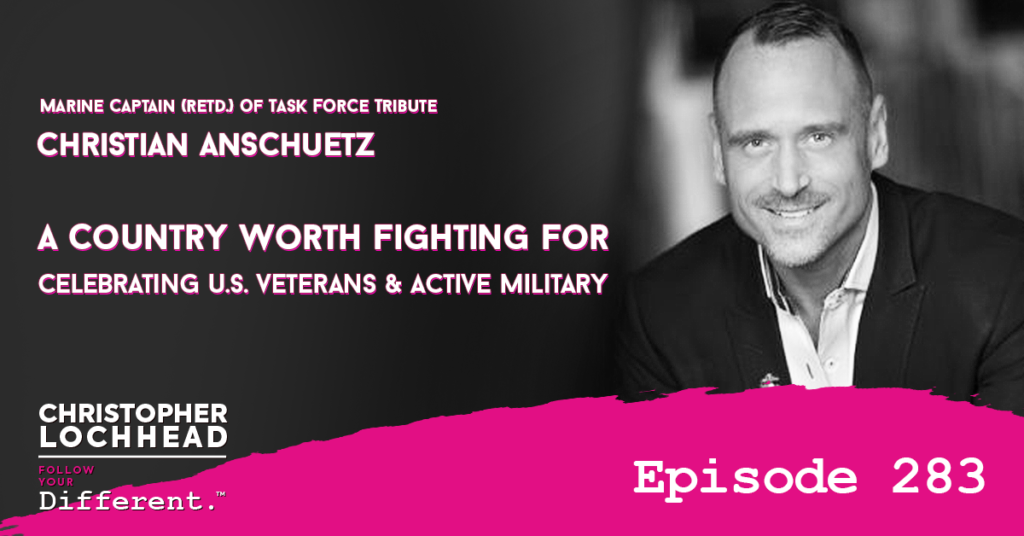
Podcast: Play in new window | Download (Duration: 1:14:13 — 51.0MB) | Embed
Subscribe: Apple Podcasts | Spotify | Pandora | RSS | More
Today’s episode of Christopher Lochhead: Follow Your Different is a love letter to our military and veterans. Our guest Christian Anschuetz shares his story of how he looked up to these brave heroes growing up, and how he became one of the heroes that serve our country.
Christian Anschuetz retired from the U.S. military as a Marine Captain. After his service, he had a long and successful career as both an entrepreneur and an S&P 500, Senior C-level executive. After hanging up his uniform as and executive and advisor, he continues to serve as one of the leaders of the organization called Project RELO and will be spearheading an upcoming endeavor called Task Force Tribute.
If you are interested in his story, and the story of thousands of active military and veterans who have served our country, stay tuned to this episode.
Christian Anschuetz & the Legendary Humans of the US Military
Imagine being 12 years old at home with your dad, as you watch a strange car pull up in front of your house. Two men in uniform get out, and one’s a chaplain. This is an experience only Goldstar families know. This was also the moment a 12-year-old Christian Anschuetz, learned that his older brother and hero, Norman, had died serving his country.
Years later, Christian finds himself joining the military himself. He did so to honor the memory of his brother, and the love of country in his heart. He eventually became a Marine Captain and went to serve for several years.
We often forget that military service in our country is completely voluntary. So it takes a tough and brave soul to go through all the harsh training, and eventually deploy to dangerous and unknown territories. To sacrifice so much to serve speaks volumes to their love and loyalty to our country.
After Christian retired from service, he found himself in the entrepreneurial side of things, where he utilized his expertise in advising and training business leaders and executives on how to hone their leadership skills.
Project RELO
Christian talks about Project RELO, a veteran non-profit that he founded. He provides a quick description of what they do, and how they help hone the nation’s top CEOs and management teams to think different.
“What we do is we take some of the nation’s top executive leadership of fortune 500, CEOs and their management teams, and we provide leadership training to them. But what we do is we actually go on to military bases, and we conduct full military operations for three days. We do everything from convoy operations, communications, weapons handling, etc.” – Christian Anschuetz
The beauty of Project RELO is that the people teaching these leadership training are transitioning military members. So it not only trains future business leaders to focus and learn leadership skills from another perspective, it also helps these transitioning military members and veterans have an idea on how they can use their previous experience to find work, or even build up new careers.
Task Force Tribute
Christian then talks about Task Force Tribute, which is a huge undertaking that Project RELO will be undertaking soon.
One thing he pointed out was that not a lot of people know that people they mingle with on a day-to-day basics is a veteran, or is serving in some capacity in the military. Part of it is the depiction of what military does in the media. So when they eventually leave the service, there are certain preconceptions on what they could do for a career or business moving forward.
As said earlier, Project RELO helps shine a light to both business leaders and military members that these military members’ skills are not just confined to military-related activities. They are well-equipped with other talents and skills, plus the military discipline that has been trained to them for years.
Task Force Tribute aims to tell their story in a more elaborate way. They want to tell the story of these legendary people, both active and veterans alike, and share their perspectives to those who they have protected and served.
To learn more about Christian Anschuetz, Project RELO, and Task Force Tribute, download and listen to this episode.
Bio
Christian Anschuetz, Marine Captain (retd.), Executive Leadership Advisor
Executive leader and advisor in art and science of ‘strategy activation,’ Christian Anschuetz helps industry leaders re-imagine and re-invent how their companies do business. His unique blend of market-shaping vision and leading-edge tech savvy coupled with a strong belief in the power of service over self helps leaders step beyond conventional thinking.
The result? Envisioning and executing future-proofing market strategies that lead to competitive edge, rapid growth, and lasting digital transformation.
Christian has held C-level and executive leadership positions at top global firms in the advertising, cyber security, global safety and supply-chain arenas, and is known for success in case studies by Microsoft, Intel, HP, and Oracle.
He is also a professor of Strategic Marketing in the MBA program at UNC in Chapel Hill.
As a proud member of the US Marine Corps, he founded and heads Project RELO, a nonprofit that helps veterans transition from military service to corporate careers through partnerships with executive business leaders.
You can catch him regularly on Cloud Wars Live with Bob Evans, “Anschuetz on Leadership,” or applying contemporary technologies to farming as cultivates his organic, sustainable lavender fields.
Links
Connect with Christian Anschuetz!
LinkedIn | Project RELO | Task Force Tribute
We hope you enjoyed this episode of Follow Your Different™! Christopher loves hearing from his listeners. Feel free to email him, connect on Facebook, Twitter, Instagram and subscribe on iTunes!
155 Content-Free Marketing: How the Marketing World Got Duped into Saying Nothing Everywhere (Snow Leopard Book Excerpt)
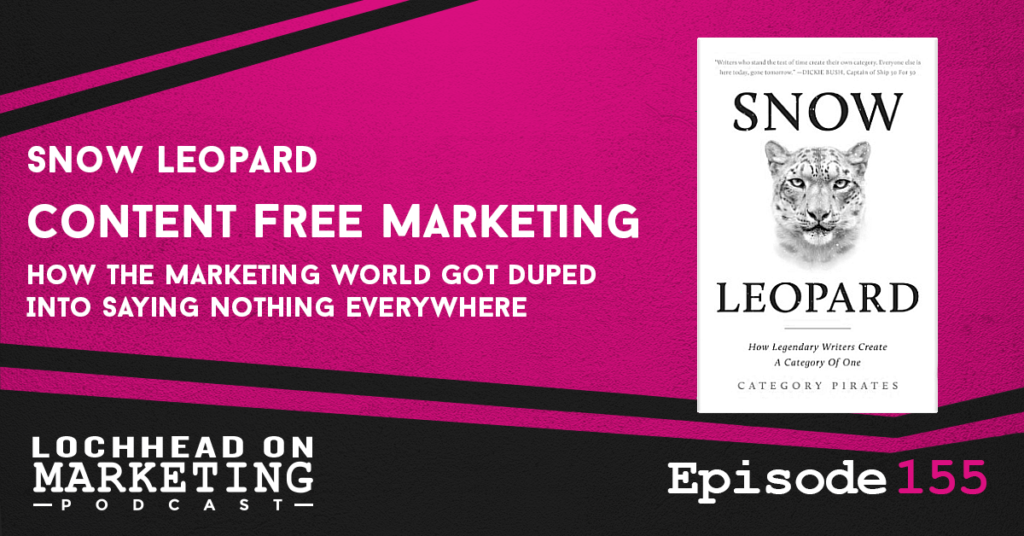
Podcast (lochheadonmarketing): Play in new window | Download (Duration: 57:05 — 39.2MB) | Embed
Subscribe: Apple Podcasts | Spotify | RSS | More
The Content Marketing category is almost 700 billion. Almost every company is working on content and increasing their content marketing investments. And yet, when was the last time you got a piece of content marketing and you said that was legendary? Let’s dig into how the marketing world got duped into content free marketing, aka saying nothing everywhere, and why this is one of the largest opportunities hiding in plain sight.
We recently launched our newest big book from category pirates. It’s called Snow Leopard: how legendary writers create a category of one. What you’re about to hear is the audio book read of me reading chapter three, which is all about content, free marketing, and why it’s a giant opportunity for the rest of us.
Welcome to Lochhead on Marketing. The number one charting marketing podcast for marketers, category designers, and entrepreneurs with a different mind.
Content-Free Marketing
The Content Marketing category is a $4 billion industry. And it’s estimated by 2024, the content marketing industry will grow another 270 billion, bringing the grand total to 700 billion.
But content marketing is broad and includes everything from creation to distribution to content management. For example, in 2020 the enterprise content management industry was valued at $47 billion and is projected to more than double over the next five years, to more than 105 billion translations of the soon to be 700 billion content marketing industry. 20% of the entire market is exclusively dedicated to managing the content that gets created.
Well, what’s the content? More importantly, how much of the content being created, especially by enterprise companies and b2c companies, is actually worth reading? When was the last time you clicked on a company blog post and opened a company newsletter or listened to a corporate podcast and said to yourself, “wow, sure am glad I clicked on that”? The fact that most content marketing is garbage represents one of the greatest marketing opportunities of our time, for those willing to buck current conventional wisdom.
Content Management
The Content Management subcategory of the mega content marketing category is growing faster than ever. And yet, the number one activity b2b companies outsource is content creation by a mile. Get this: 86% of b2b organizations surveyed said they outsourced content creation. The next closest activity is content distribution, which only 30% of b2b organizations surveyed said they did editorial planning.
Now, let’s connect these two data points. On one hand, Content Management is growing at breakneck speed, while Content Creation creates more to manage. On the other hand, content creation is often the number one most outsourced marketing activity. Which means companies are deferring the single most important aspect of content, which is the creation of each and every idea and who’s coming up with these ideas.
Gary Vee D
As we wrote about in our mini book, The Me Disease, many marketers today have, unfortunately, caught Gary Vee D. It is a content disease that leads creators and companies alike to believe the whole purpose of content creation is to do it and do it as often as possible. It doesn’t matter if it’s good or if it’s valuable. Just say it out loud and say it off and, “pump out 200 pieces of content today”.
Gary Vee and other digital marketing “gurus” have led the masses to believe the fact that you did it means you’re succeeding. More equals mo betta. And so, every marketer everywhere has adopted this spray and pray approach where 100% of the emphasis is on the output, and essentially zero of the emphasis is on the quality of the content, and what is actually being said.
To hear more about Content-Free Marketing, and how to avoid falling into this marketing trap, download and listen to this episode.
Bio
Christopher Lochhead is a #1 Apple podcaster and #1 Amazon bestselling co-author of books: Niche Down and Play Bigger.
He has been an advisor to over 50 venture-backed startups; a former three-time Silicon Valley public company CMO and an entrepreneur.
Furthermore, he has been called “one of the best minds in marketing” by The Marketing Journal, a “Human Exclamation Point” by Fast Company, a “quasar” by NBA legend Bill Walton and “off-putting to some” by The Economist.
In addition, he served as a chief marketing officer of software juggernaut Mercury Interactive. Hewlett-Packard acquired the company in 2006, for $4.5 billion.
He also co-founded the marketing consulting firm LOCHHEAD; the founding CMO of Internet consulting firm Scient, and served as head of marketing at the CRM software firm Vantive.
We hope you enjoyed this episode of Lochhead on Marketing™! Christopher loves hearing from his listeners. Feel free to email him, connect on Facebook, Twitter, Instagram, and subscribe on iTunes!
282 How To Do The Impossible with Colin O’Brady, First Man To Solo Cross Antarctica & Author of The 12-Hour Walk
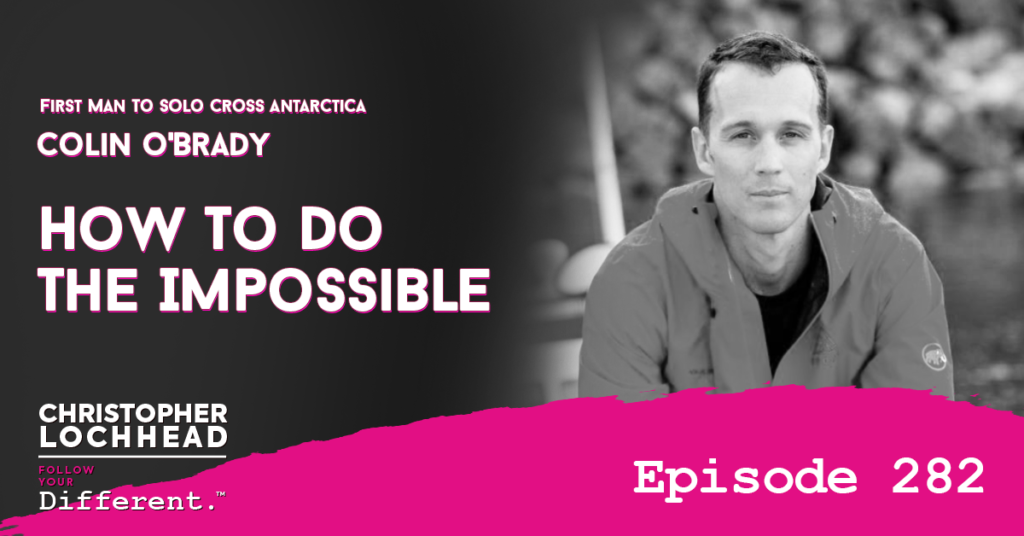
Podcast: Play in new window | Download (Duration: 1:20:59 — 55.6MB) | Embed
Subscribe: Apple Podcasts | Spotify | Pandora | RSS | More
On this episode of Christopher Lochhead: Follow Your Different, we talk about how ordinary people do legendary things and push ourselves to go beyond ourselves with our guest, Colin O’Brady.
Colin O’Brady is an extraordinary extreme athlete. He has summited Everest twice, and he is the first person ever to solo trek across Antarctica. And he’s a 10-time world record breaking explorer and adventurer, and is considered to be one of the most legendary endurance athletes on the planet.
Yet Colin considers himself a regular dude, and will share his story on how we can all do some serious legendary things in our lives.
Colin O’Brady on his reasons for doing what he does
The conversation starts off with the question of why Colin does what he does.
“Why do I do what I do? Yeah, it’s an easy question as you’re like, “Why would somebody walk alone across Antarctica for 54 days, dragging a 375-pound sled by themselves?” I asked myself that question sometimes.” – Colin O’Brady
That said, Colin is very happy with his achievements, especially with his wife as his number one supporter. They have built their business together, and she has helped Colin with these world record expeditions and how to execute them. And they don’t forget to have fun while doing so.
“I remember calling her around day 35 and in a sadly scrapped crackly sat phone connection I said to her, “Hey, if I ever tell you I want to do this again. Make sure to remind me that I don’t.”” – Colin O’Brady
Type 2 Fun
Colin asks if we are familiar with the phrase, type 2 fun.
“So type one fun is like fun. We you know, normal fun. You know, you’re drinking with your buddies, you’re dancing, you’re partying, you’re hanging out with your wife and are watching a beautiful sunset. It’s just fun, just fun for fun. Type two fun is it’s not super fun.” – Colin O’Brady
For Colin, type 2 fun is the fulfillment one gets from pushing their body to the limits, and exploring the human potential. Not just in the physical sense, but also emotional and mental sense.
The Desire to be outside is part of our DNA
We talk about our outdoor trips, and while it is not as extreme as Colin’s adventures, we do get that exhilaration and joy of exploring the outdoors.
Colin agrees with this, and remarks that as human, it is in our DNA to explore the outdoors.
“I think it’s in our DNA to be outside in nature. Like you said, kind of those moments where after a busy week, or a busy month, you look up and you kind of watch the clouds go pass for a second, or something like that. There’s something very grounding in those experiences.” – Colin O’Brady
To hear more from Colin O’Brady and how to do the impossible, download and listen to this episode.
Bio
Colin O’Brady is a 10-time world record breaking explorer and one of the world’s best endurance athletes.
He isn’t your typical adventurer despite his unmatched athletic accomplishments including a world-first solo crossing of Antarctica, a world-first ocean row across Drake Passage (from South America to Antarctica), and summiting Mt. Everest twice. Colin is an expert on mindset, a highly sought-after keynote speaker and a New York Times bestselling author.
Colin is also a television host, an executive producer and an entrepreneur who has built and sold companies. And, he’s done it all after overcoming a devastating accident – that nearly left him unable to walk – to prove that anything is possible.
Links
Connect with Colin O’Brady!
Check out his new book: 12 Hour Walk: Invest One Day, Conquer Your Mind, and Unlock Your Best Life
We hope you enjoyed this episode of Follow Your Different™! Christopher loves hearing from his listeners. Feel free to email him, connect on Facebook, Twitter, Instagram and subscribe on iTunes!
154 The Solo Thought Leader with Diego Pineda
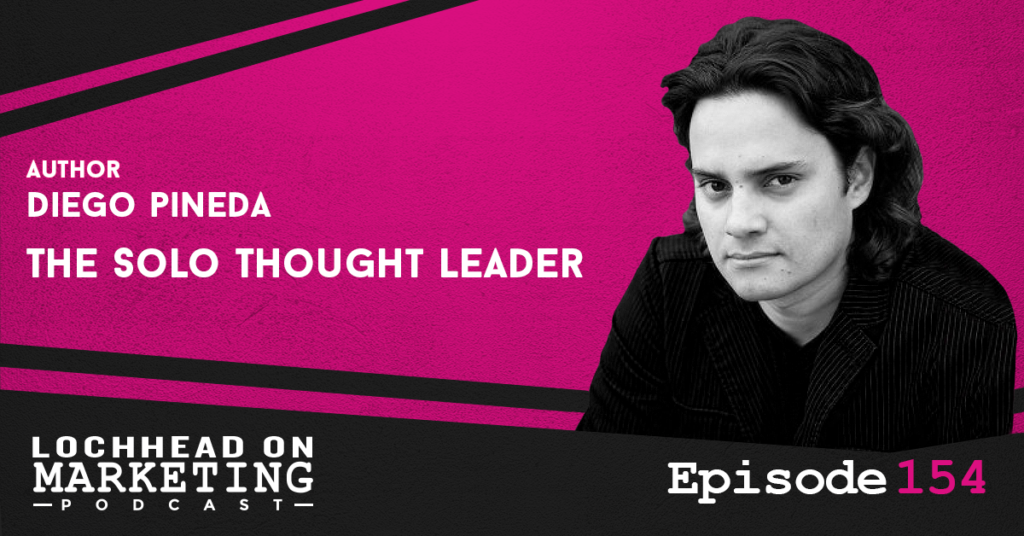
Podcast (lochheadonmarketing): Play in new window | Download (Duration: 1:23:11 — 57.1MB) | Embed
Subscribe: Apple Podcasts | Spotify | RSS | More
On this episode of Lochhead on Marketing, let’s talk about how you can be a Thought Leader. More specifically, we’ll discuss how to be a Solo Thought Leader and build yourself up with our guest, Diego Pineda.
Diego Pineda is the author of the book The Solo Thought Leader: from Solopreneur to Go-To Expert in Seven Steps. Being viewed as a thought leader is a powerful thing. Becoming known for a niche that you own through leading thoughts is one of the most powerful ways to get there to either have a legendary career as a solo creator or a thought leader of some kind.
Welcome to Lochhead on Marketing. The number one charting marketing podcast for marketers, category designers, and entrepreneurs with a different mind.
Diego Pineda on Going Solo
The conversation starts off with the topic of the recent great resignation, or rather the aftermath of it. According to the data gathered over time, it seems that most of the people who resigned went solo or opened their own businesses.
“I actually talked to somebody who does this for a living, like helping people transition from being in a company to going solo. And he said, even just when the pandemic started, it was about 35% of the people were leaving their jobs. He thinks it is much larger than that. So there’s a lot of people just going out of their jobs and going solo. So this is a trend. And I mean, I think it’s gonna be growing.” – Diego Pineda
Why People are Going Solo
When asked why this was the case, Diego explains that it could be due to a number of things.
“I think there’s a few things. One is, people during the pandemic just realize what was possible, just working from home, having this freedom. They feel like managing their own time and not having to commute or being an office or all that BS that has to deal with our office politics. They realize there’s this option, so why go back?
Second, I think just the technology, the tools, and being able to just reach out people through LinkedIn, through social media and getting clients that way is possible. So people say it’s possible, so why not? I can do it. Right. So and then you get people like that on the internet, saying, “Hey, I reached in two years while going solo, I went from zero to a million.” Of course, those are some exceptional cases, but then other people will think it’s possible. “So why not me? Why not try it?” They just go for it.” – Diego Pineda
With new technology and tools being developed at breakneck speed, and existing ones being improved to be more versatile than ever, it’s really no wonder why someone would think they could go solo, as long as they learn how to make use of these tools at their disposal.
Be your own Thought Leader
When the topic of influencers and content creators just spewing out the same thoughts of someone who is at the forefront of a certain category, Diego agrees that not only is it not sustainable, but you are also competing for a small piece of that niche.
According to Diego, you need to be your own Thought Leader and come up with your own ideas. If nothing else, have a unique angle that can differentiate you from the rest. One way to do that is to find something that is dogma, or the “best” practice in an industry, and find if there is anything wrong with it. From there, you can come up with ideas that can fix the problem, or maybe come up with something entirely different as a solution.
To hear more from Diego Pineda and how you can be a Solo Thought Leader, download and listen to this episode.
Bio
Diego Pineda is the author of two novels, 9 non-fiction books, and hundreds of articles and blogs as a science writer, a business writer, and a sales and marketing writer.
He started his career as a medical writer while writing fiction on the side.
Diego is also a book coach helping solopreneurs and business leaders write their first book fast so they can become thought leaders in their industries, gain authority and visibility, and make more money.
Links
Connect with Diego Pineda!
The Solo Thought Leader | LinkedIn
We hope you enjoyed this episode of Lochhead on Marketing™! Christopher loves hearing from his listeners. Feel free to email him, connect on Facebook, Twitter, Instagram, and subscribe on iTunes!
281 How To Overcome Anything with World Champion Power Lifter Chris Duffin
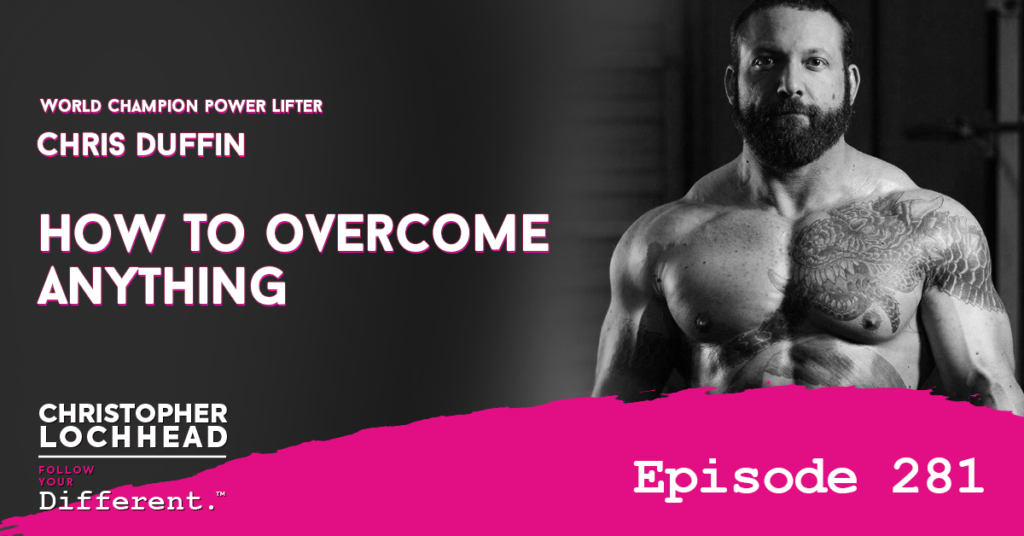
Podcast: Play in new window | Download (Duration: 1:40:29 — 69.0MB) | Embed
Subscribe: Apple Podcasts | Spotify | Pandora | RSS | More
On this episode of Christopher Lochhead: Follow Your Different, we talk about how we can create & design your life, and overcome anything with our guest, Chris Duffin.
Chris Duffin is the world record holder in 1000-pound deadlifts and squats. He is one of the strongest men on planet Earth, which is a very legendary achievement. He’s also an author of a fascinating riveting book called The Eagle and the Dragon, a story of Strength and Reinvention.
Those achievement on themselves are amazing, but when you hear more about his background, it becomes a whole new level of legendary.
Liquid Courage
The conversation starts on the topic of alcohol, and how it helps take down the defenses that people normally have with strangers or on speaking in public.
Chris Duffin follows up with a related piece that he wrote about drinking back in 2014, which was called Whiskey and Deadlifts.
“It actually talks about how alcohol can be used as a performance enhancer. And I talked about the history of it actually being used as that which a lot of people aren’t aware of.” – Chris Duffin
It’s certainly not an endorsement of excessive alcohol drinking by any means. But it gives a good glimpse on the world of powerlifting. Chris also says that he might update it soon, so look out for that.
Chris Duffin on his journey
The conversation shifts to Chris’ life story, which he admits took him a while to tell it comfortably. For him, it shows how you can move the needle in life with the right approaches from a mental aspect. For Chris, it’s not exactly a “woe is me” story, as he has created what he wants to do with his life now, and moving forward.
The story is actually opening from his book, The Eagle and the Dragon. It starts when he was six years old and living in the wilderness. Not just for camping and vacationing, but full-on living in the wilds, exposed to deadly animals and the like.
“On that first story, I was being taught how to handle and capture live rattlesnakes, we were killing them, so that we could sell the skins and try to make ends meet. But also, I was being taught at six years old, because that was the environment we lived in. And then I needed to have that for my safety.” – Chris Duffin
Creating His Own Path
Other stories in Chris’ childhood involved other dangerous elements in their life, in this case it was traffickers and serial killers.
To be exposed to such situations at such a young age, it was not an environment that someone should be exposed to growing out. Which is why Chris found himself gravitating to sports, trying to bring in some money to help the family, and he also found comfort in doing athletic activities.
Due to his efforts, he eventually got a full-ride academic scholarship to go to a school for a dual engineering degree, and eventually worked on his MBA. As he was working and studying away from his family most of the while, it apparently got worse on the home situation. So much that he had to take custody of his little sisters, so he could help and guide them towards better choices in life, and help heal the trauma that they have been through as well.
To hear more about Chris Duffin and how to overcome anything in your life, download and listen to this episode.
Bio
Links
Connect with Chris Duffin!
Website | Instagram | Linkedin | Facebook | Youtube
Check out his book, The Eagle and the Dragon, a story of Strength and Reinvention
We hope you enjoyed this episode of Follow Your Different™! Christopher loves hearing from his listeners. Feel free to email him, connect on Facebook, Twitter, Instagram and subscribe on iTunes!
153 The Three Marketing Metrics That Matter
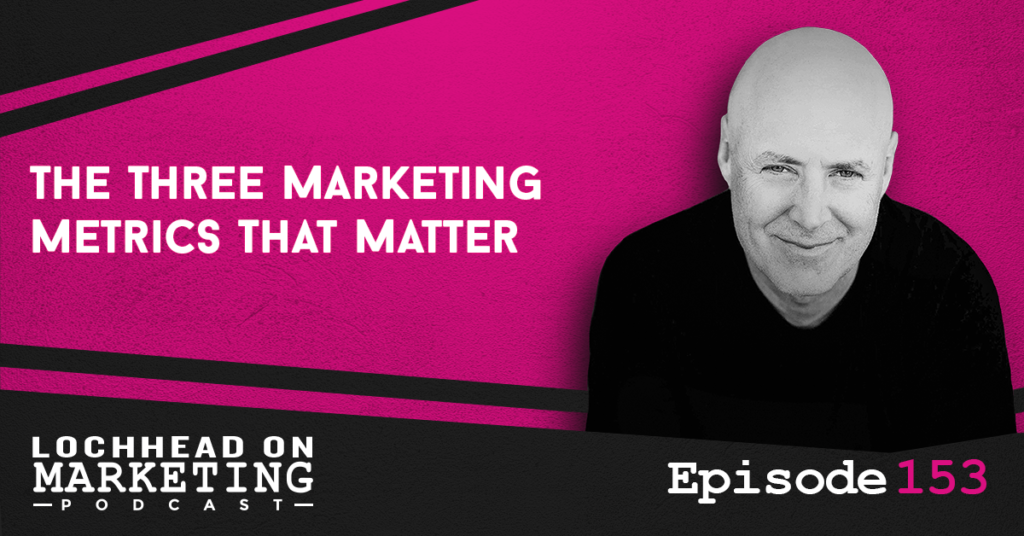
Podcast (lochheadonmarketing): Play in new window | Download (Duration: 13:37 — 9.4MB) | Embed
Subscribe: Apple Podcasts | Spotify | RSS | More
On this episode of Lochhead on Marketing, let’s talk about the three marketing metrics that matter. Because it appears as if there’s still a lot of confusion out there about this. So I thought we could unpack the real metrics that matter for marketing.
Welcome to Lochhead on Marketing. The number one charting marketing podcast for marketers, category designers, and entrepreneurs with a different mind.
The Three Marketing Metrics
Now, let’s talk about the three marketing metrics that matter, and break them down.
Marketing that does not drive revenue is not marketing
A lot of the counterarguments that I have received on this point is that marketing stuff people do can drive revenue. But the thing is, most of them do not drive long-term revenue. So if it doesn’t make the cash register sing consistently, It ain’t got that thing.
But what about brand advertising or Awareness campaigns? Those things only matter if you already have revenue coming in over time. If you’re trying to build up awareness and brand before putting up a good product and making good revenue out of it, that’s like putting the cart in front of the horse.
Marketing that does not drive category potential is not marketing
Related to creating revenue, is building up category potential. It’s important, as it helps build demand for your product, whether you are creating a new category, or revolutionizing one with your product.
Because when you have the ability to create demand, it will convert to revenue over time, which circles back to the first metric.
Marketing that does drive increases in the market cap or valuation is not marketing
Here’s the AHA for the third metric: investors in growth companies and stocks buy potential, not performance.
What drives our market cap is the investor’s perception of the size and growth rate of the category that we’re designing. Be their belief about our ability to prosecute the magic triangle, product, company, and category and earn 76% of the economics in the category that we are designing, because that’s the average number that the average category cleaner can get.
The other metrics like revenue growth, customer growth, margin growth, etc. are all metrics that validate that this company has massive potential.
How Legendary Marketing Executives do it
The most legendary marketing executives, CEOs and entrepreneurs, when they talk to investors, the first thing they say is that we are designing a legendary new market category that has massive growth potential. And let me tell you why. So they start with the potential and marketing creates that perception and then helps the company turn perception into reality.
Those are the metrics that matter: marketing needs to drive revenue, marketing needs to drive category potential, and then marketing needs to convert category potential in the eyes of investors into market cap. Because the company with the biggest market cap that is sustainable, I’m not talking about some kind of bullshit magic trick here. I’m talking about building enduring value over time. as measured by market cap, the number one market cap company in the category, always wins.
Revenue, of course, is a critical metric for driving market cap. But it’s not the only one. The perception of the future is actually more important from a market cap perspective. And so marketing drives revenue, short-term, medium-term, and long-term marketing drives market potential.
To listen to a more detailed explanation of the three marketing metrics, download and listen to this episode.
Bio
Christopher Lochhead is a #1 Apple podcaster and #1 Amazon bestselling co-author of books: Niche Down and Play Bigger.
He has been an advisor to over 50 venture-backed startups; a former three-time Silicon Valley public company CMO and an entrepreneur.
Furthermore, he has been called “one of the best minds in marketing” by The Marketing Journal, a “Human Exclamation Point” by Fast Company, a “quasar” by NBA legend Bill Walton and “off-putting to some” by The Economist.
In addition, he served as a chief marketing officer of software juggernaut Mercury Interactive. Hewlett-Packard acquired the company in 2006, for $4.5 billion.
He also co-founded the marketing consulting firm LOCHHEAD; the founding CMO of Internet consulting firm Scient, and served as head of marketing at the CRM software firm Vantive.
We hope you enjoyed this episode of Lochhead on Marketing™! Christopher loves hearing from his listeners. Feel free to email him, connect on Facebook, Twitter, Instagram, and subscribe on iTunes!

